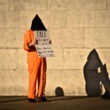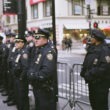A Reasonable Judge at Justice?—Choosing a replacement for Alberto Gonzalez did not prove all that easy for George W. Bush. Senate Majority Leader Harry Reid made it clear that former solicitor general Theodore B. Olson was damaged if not dead. Homeland Security Secretary Michael Chertoff had so badly botched the federal response to Katrina that he would have been a heavy lift in the Senate. So Bush settled on Michael Mukasey to clean up the mess Attorney General Gonzales had left behind at the Department of Justice. Appointed to the federal bench in Manhattan by Ronald Reagan in 1987, Mukasey earned a reputation as a law-and-order judge. Yet he has demonstrated a judicial independence that might wear thin with West Wing hard-liners, and his appointment can’t please Vice President Dick Cheney’s staff.
Shortly before returning to private practice in 2006, Judge Mukasey was less than judicious when confronted by an assault on the constitutional authority of federal judges. At issue was a provision in the Amber Alert child-protection bill, which President Bush had signed into law in April 2003. An amendment by Representative Tom Feeney (R-FL) imposed further limits on already limited judicial discretion in sentencing. The Feeney amendment also provided unprecedented Congressional oversight of the third branch, mandating access to sentencing reports of individual judges. Members of Congress could use the reports to make lists of judges who deviated from federal sentencing guidelines. Mukasey was furious. “They can have their blacklist,” he said. “We have life tenure.”
Mukasey’s backlash against Congressional and executive assault on the independence of federal courts had to rankle administration advocates of a unitary executive. Mukasey also got crossways with the Bush/Ashcroft Justice Department when he ruled that terror suspect José Padilla had the right to consult an attorney, at a time when Padilla was in solitary confinement with no charges filed against him.
Yet nominating Mukasey can’t be equated with appeasing Senate liberals. As a judge, Mukasey supported using the material witness statute to detain individuals without charging them. The statute had traditionally been used to hold someone in custody to preserve testimony against another party. Particularly useful in Mafia investigations, it protected witnesses from intimidation (or worse) while they waited to testify. When Homeland Security Secretary Michael Chertoff was a federal prosecutor, he began using the material witness statute in a novel way, detaining people as witnesses against themselves. As Bush’s first AG, Ashcroft saw the potential in Chertoff’s creative application of the law. After the 9/11 attacks, Ashcroft used the statute in mass roundups of hundreds of individuals who were held with no bail, no charges, and limited access to attorneys.
In April 2002, Judge Shira Scheindlin of the Federal District Court in Manhattan ruled against Ashcroft’s holding 1,200 individuals as material witnesses. “Since 1789,” Judge Scheindlin wrote, “no Congress has granted the government the authority to imprison an innocent person in order to guarantee that he will testify before a grand jury conducting a criminal investigation. [To detain people] who are presumed innocent under our Constitution in order to prevent potential crimes is an illegitimate use of the statute.” Judge Mukasey disagreed. His legal reasoning, quoted in a New York Times article, pivoted on a statement that Chief Justice John Marshall had made in 1807: “The public has a right to every man’s evidence.”
The jury might still be out on Ashcroft’s liberal application of the material witness statute. Last year the federal government wrote Oregon attorney Brandon Mayfield (a Muslim) a $2 million check as a settlement for holding him as a material witness for two weeks after a closed, secret trial to justify his detention. Mayfield was more fortunate than the individuals of Middle Eastern descent caught up in Ashcroft’s post-9/11 dragnet. He was able to retain Wyoming trial-lawyer legend Gerry Spence, who had the skill and resources to take on the federal government.
Mukasey arrives at Justice a fully formed jurist and lawyer, lacking the canine fidelity to the president that was one of several flaws that made Gonzales a disaster. He also tried one big pre-9/11 terrorism case, convicting Sheik Omar Abdel Rahman in the 1993 bombing of the World Trade Center. Yet members of the Senate Judiciary Committee might explore how Mukasey’s position on material witness detention has evolved since the prosecutorial excesses that immediately followed the attacks of 9/11.




0 Comments